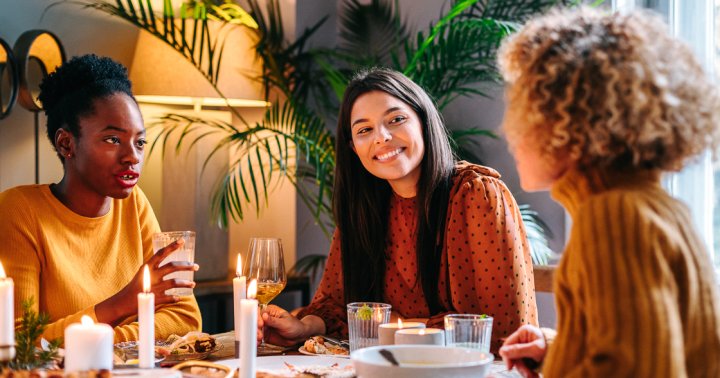In relation to taking mind well being into our personal arms, our meals selections appear to be the best factor we will management. Take it from board-certified psychiatrist, skilled chef, and diet specialist Uma Naidoo, M.D.: A triple risk within the “meals as medication” area, she has seen highly effective leads to her sufferers who make easy dietary swaps to optimize their psychological well being.
And even for those who do not meet a sure psychological well being prognosis, she says, strengthening your mind perform with meals is at all times a good suggestion. “You are going to eat on daily basis, so why not pack within the meals that will provide you with a greater mind perform?” she shares on this episode of the well being information podcast.
Beneath, the eight mind meals she swears by for higher psychological well being:
1.
Beans and legumes
Analysis has proven the intestine instantly impacts the mind—there’s a channel connecting the 2 (generally dubbed the gut-brain connection or gut-brain axis) that permits the intestine and mind to speak forwards and backwards. That stated, any gut-healthy meals can also be concurrently brain-healthy. Enter, fiber-rich beans and legumes. These plant-based sources feed the wholesome microbes in your intestine by supplying them with fiber.
By way of which beans and legumes to succeed in for, Naidoo is keen on black beans: “They’re wealthy in magnesium, and that appears to be poor in extraordinarily anxious people.” In actual fact, research have proven {that a} deficiency in magnesium can kick-start the sympathetic nervous system (when this sympathetic nervous system is on overdrive, it could result in elevated anxiousness).
2.
Yogurt
With reference to gut-healthy meals, we might be remiss to not focus on probiotics. That’’s the place yogurt is available in, as this fermented meals provides these wholesome micro organism to your intestine. “It fortifies your intestine by bringing again the great bugs that you must thrive. It is a straightforward step we will just about do as we speak,” Naidoo explains. And whereas she loves plain dairy yogurt, she mentions you too can go for a nondairy model with stay lively cultures. Simply be sure you buy a plain possibility, as fruit-flavored variations can embody tons of sugar. To make it simply as candy, she’s keen on topping a parfait with cinnamon and berries.
3.
Darkish chocolate
Chocolate lovers, lean in: Sure, darkish chocolate has its fair proportion of antioxidants (polyphenols, to be actual, which will help neutralize free radicals and struggle oxidative stress). However in line with Naidoo, there’s one more reason darkish chocolate ranks excessive on her listing of mind meals: “Natural darkish chocolate has an added benefit. The method is fermented, so it is also a fermented meals in that means.” It is true—cacao beans are fermented, dried, roasted, then faraway from their shells (it is also what provides darkish chocolate its barely tart style). Simply be sure you’re shopping for natural, uncooked darkish chocolate or one with not less than 70% cacao content material.
4.
Avocado
Ah, the mighty avocado. It is beloved for its wholesome fats content material, however Naidoo particularly loves the fruit for its fiber and magnesium. “1 / 4 of a medium-size avocado a day provides wholesome fiber and fats. It additionally has magnesium, which has proven to be useful for melancholy.”
5.
Salmon
“Omega-3s have been studied in anxiousness as properly,” notes Naidoo. Particularly, one examine reveals that omega-3 fat can lower stress, and one other demonstrates that diets wealthy in omega-3 fatty acids will help promote a wholesome emotional stability and constructive temper. That is why Naidoo shares up on sustainably sourced salmon; in truth, she says it is on common rotation in her fridge.
6.
Eggs
Eggs are naturally chock-full of melatonin, says Naidoo, which will help you attain deeper sleep. (She even mentions an omelet is among the greatest dinners to organize your physique for sleep.) And since a wholesome sleep schedule is crucial for wholesome mind perform, meals that naturally promote sleep ought to make it onto your plate, particularly within the night. If you cannot tolerate eggs, she mentions soybeans and quinoa additionally comprise the amino acid L-ornithine, which has been proven to enhance sleep high quality.
7.
Jicama
In accordance with Naidoo, a stability of pre- and probiotic-rich meals is essential for that gut-brain connection. Now, we have mentioned probiotics at size, however certainly one of her prebiotic-rich favorites is none aside from jicama: “It is really easy to work with if you get used to it. It is tremendous crunchy—you possibly can add it to a salad, dip it into hummus, or grate it,” she says. And since it has a gentle taste, you possibly can add it to a large number of dishes, be it a crunchy kale slaw or vegan “cheese fries.”
8.
Chili pepper
Naidoo is a fan of spices for his or her taste and dietary worth: “Spices can change any meal, they usually have completely different well being advantages.” One among her favourite spices for mind well being? Chili pepper. It has a excessive anti-inflammatory profile, and Naidoo notes it could assist with temper, power, and immunity. The analysis prevails: One animal examine discovered that the capsaicin from chili peppers can cut back depressive signs. Moreover, one other examine discovered that individuals who devour chili peppers frequently lowered their threat of dying from coronary heart assaults and cerebrovascular deaths (like strokes).
The takeaway.
By including a mixture of fibrous, anti-inflammatory, pre- and probiotic-rich meals, you possibly can higher optimize your mind perform. In fact, all of us have solely distinctive intestine microbiomes, so not each meals will have an effect on all of us in the identical actual means. However strive including Naidoo’s famous person mind meals to your subsequent grocery listing, and see how you are feeling—they’re definitely not the one brain-healthy meals on the market (discover 20 extra right here), however contemplate them simple starter staples.
Get pleasure from this episode! And do not forget to subscribe to our podcast on iTunes, Google Podcasts, or Spotify!
And would you like your ardour for wellness to alter the world? Change into A Useful Diet Coach! Enroll as we speak to hitch our upcoming stay workplace hours.



















